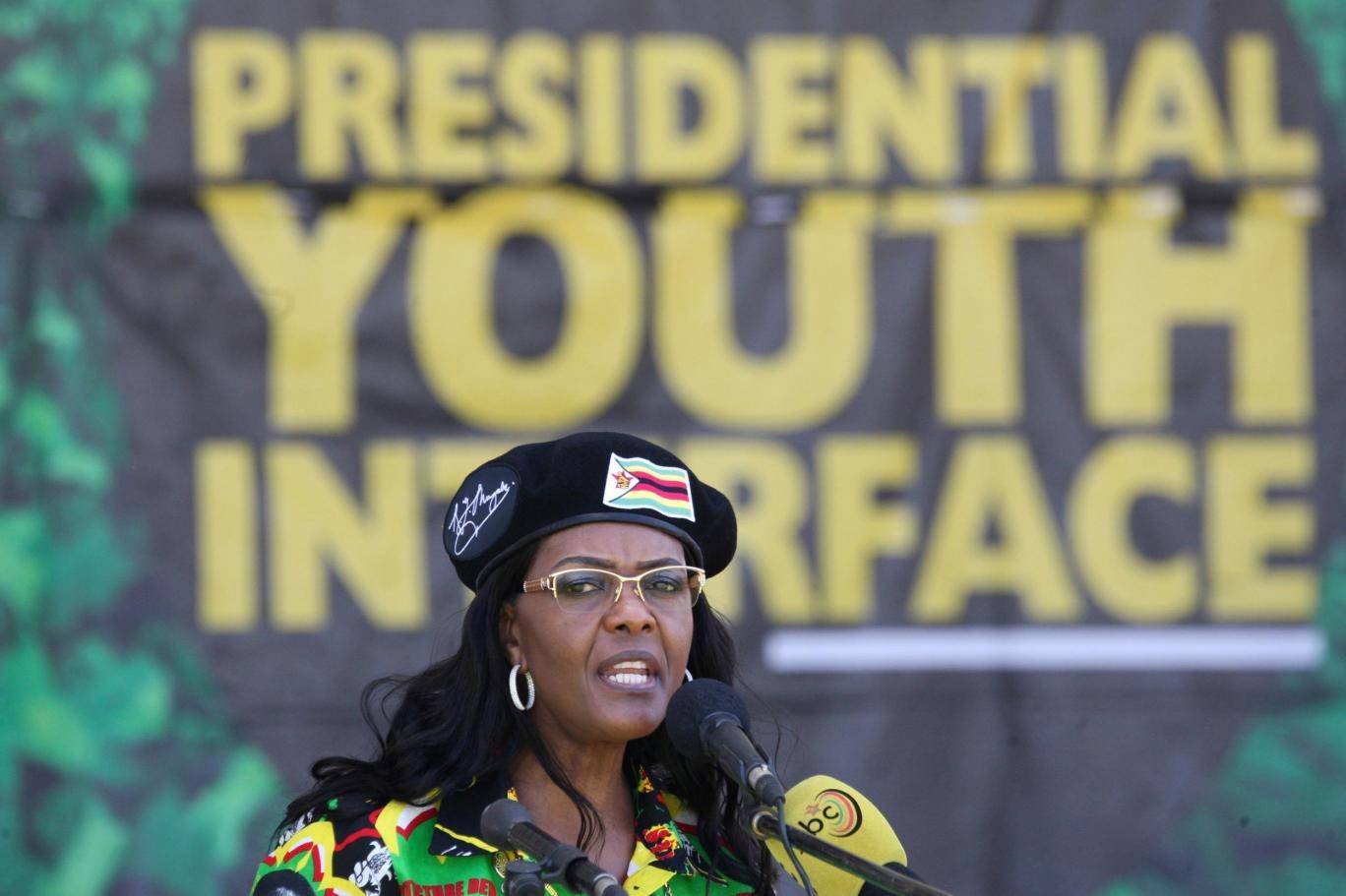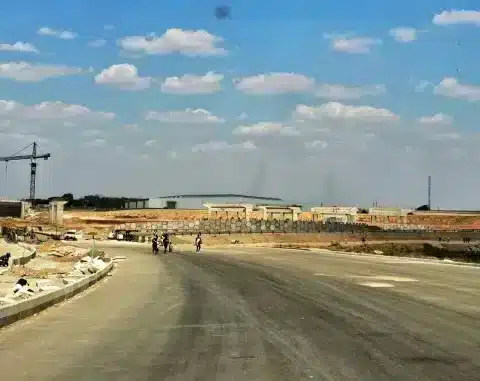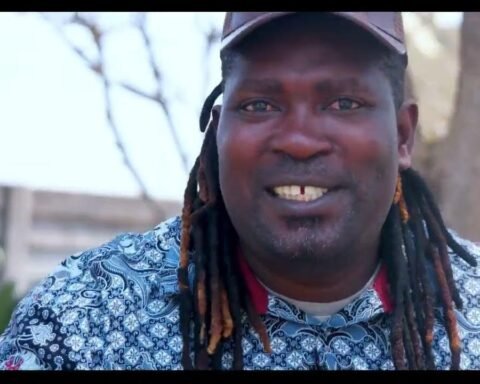Mazowe was a very attractive place to work and live and that was the reason Grace Mugabe was determined to get her hands on it.
Robert Mugabe’s wife normally got what she wanted: here, a lush and picturesque vista, rolling hills, rich and fertile soil watered by a deep dam, the greenery pitted with seams of gold being mined, all within striking distance of the markets of the capital Harare.
Zimbabwe’s First Lady focused on turning this piece of Mashonaland into her very own domain.
She had farmers evicted from their land, got the owner of a dairy to sell it to her at a knock-down price, had her minions muscle in on the goldmines, and even took over the state-run dam.
Ms Mugabe also opened an orphanage with much publicity and complemented it with an expensive private school.
And, of course, there was the need for a home for herself, a lavish mansion in a secure complex.
“Graceland”, as it became known, took shape with the police and hired thugs acting as her personal force and descending on those who had the temerity to object.
“It just went on and on. We had enough of this bullshit … the harassment, the intimidation,” says Colin, the white owner of a goldmine. “We were going to flood the mines, pack up what could and move to Zambia,” he adds. “But now, of course, things are changing. We are going to wait and see how things turn out. Maybe things will improve after all”.
He was one among many in Mazowe relieved and delighted at the departure of Robert and Grace Mugabe from power, although he is not yet confident enough to give his full name.
The farmers, who are black, have started drifting back to their properties.
There has even been a march of celebration by local people, something which would have been unthinkable in the past.
Ms Mugabe, “Gucci Grace” or “DisGrace” as she is known to her many critics, has not been seen since the military coup 12 days ago.
She is believed to be at Blue Roof, the former presidential couple’s home on the outskirts of Harare.
Ms Mugabe’s Mazowe home is still under police guard, but people can now congregate near the front without being chased away.
At the dairy farm uneasy workers are unsure about what will happen to their jobs, the gates of the school and the orphanage are locked; Ms Mugabe had not been there to see the children for a while even before the dramatic recent events.
People talk now about what they have endured, if with hesitation. The Mugabes have been given immunity from prosecution by the military and the new president, Emmerson Mnangagwa, nicknamed “The Crocodile” because of his political cunning.
What Mr Mnangagwa’s long-term plan may be for the Mugabes is yet to emerge. The new president was an ally of Mr Mugabe until he was sacked, reportedly at the request of the First Lady. Many of those likely to be in his new cabinet will have been part of the previous regime.
“What happened became so much part of our lives that it is difficult not to keep feeling tense. The police set up roadblocks where they find excuses to fine you. They were always aggressive, they knew they were untouchable and they were,” says Colin.
“People were kidnapped and beaten up by thugs, that happened to me with a couple of my workers. The police were filling their pockets while Grace was filling her bank accounts abroad and, all the time, grabbing more and more land around here.”
The attempts to grab Arnold Farm, also known as Manzoe Farm, led to resistance and became a cause célèbre. It had been taken from white farmers around 17 years ago under Zimbabwe’s indigenisation programme, and redistributed to black families. After opening her private school Ms Mugabe decided she wanted to turn it into a wildlife area and told the residents they had to leave.
Grace Mugabe’s decision about the farm led to clashes between the police and local residents (Getty)
There were regular confrontations between the police and the 146 families living on the farm. Stella Nikisi showed scars on her legs from injuries she sustained during an attempted eviction. The 65-year-old said: “We were like prisoners at Arnold Farm because of Grace and Robert Mugabe. They had the police tear down the huts we built, the police threw our food on the ground and trampled on it. We had to sleep on the ground with our children and grandchildren while the Mugabes lived like Gods and looked down on us poor people”.
Human rights groups took up the case of the farmers. Although many judges were fearful of the Mugabes, they managed to obtain a court order allowing the farmers and their families to stay. The legal papers presented implicated minister of commerce Ignatius Chombo and the country’s head of police Augustine Chihuri. Mr Chombo was arrested after the coup and appeared in court on Saturday on corruption charges. Mr Chihuri had been heckled and booed at the inauguration of the new president the day before.
“Grace Mugabe never respected that court order, she just kept sending police here to try and force us out”, says Innocent Dube, a community leader. “Things were very difficult, we were being targeted constantly. Not only did Grace not obey the court we heard that she was angry we had dared to do this.”
The First Lady did not hide her anger. She claimed the dispute was being used by political opponents to damage herself and her husband. “I might have a small fist, but when it comes to fighting I will put stones inside to enlarge it. Do not doubt my capabilities” she warned. “I will not tolerate people who want to harm me.”
The farmers were not using the land properly, Ms Mugabe claimed, and their real reason they wanted to hang on was because they were panning for gold.
She did not mention, of course, that she had taken a deep interest in this: people close to her had started a campaign to take over the smaller goldmines.
Denboy Chaparadza, chairman of the Arnold Farm Residents Association said: “It was a ridiculous situation, people were having to live under trees because of Grace. Our homes were destroyed and food stolen and ruined and we could not even use the Mazowe Dam for fishing because officials told us that Grace had put her fish in it and everything in the dam belongs to her.
“There were these youths, her supporters who put a curfew on between 10 at night and four in the morning around the dam,” said Chaparadza. “Anyone caught just walking around that time would be detained and fined. We have had so many wrong things happening around here. All that should change, it must change.”
Last week protestors picketed the school set up by Ms Mugabe and then staged a rally in Mazowe, singing and dancing and calling for justice.
Many blamed Mr Mugabe for allowing the abuse by his wife. “Power Should Not Be Sexually Transmitted”, read one of the placards.
A sign remains at the entrance to Arnold Farm stating: “Trespassers Will Be Prosecuted”, but the police who would enforce the edict were keeping out of sight. “Just think, I can do anything I want to with my land now,” Innocent Dube says, shaking his head in wonder. “I won’t have to worry about police coming and destroying everything again. It is such a good situation now, we are all very happy this big change has taken place.”
Stopping to buy supplies at the Mazowe Dam Kiosk, Ian Ross, a 59-year-old engineer, a white Zimbabwean, is also positive about the future despite the turbulence of the past.
“The situation throughout Zimbabwe had become pretty disastrous, especially in the last five years,” he says. “We have been praying for something to happen and we are glad that prayer has been answered.”
“On things like land redistribution I think it is important to understand that was necessary but the way it was done led to all kinds of mistakes and tragedies.
“People should have been given land to farm on generous leases with state help, the funding and expertise.
“But instead of the state owning the land, greedy powerful individuals like Grace Mugabe took over so much of it.
“But that can be changed, this country has tremendous resources, best of all its people. We can start rebuilding now, all we need is the political will to do it.”








